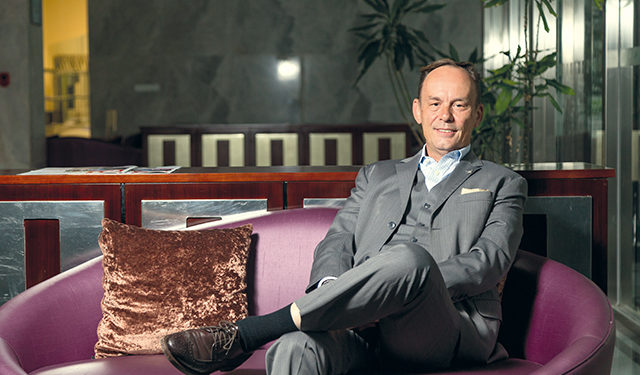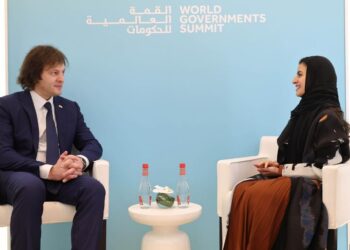The coronavirus pandemic, apart from bringing significant hardship to the population worldwide, and the healthcare sector, also affected companies and businesses. However, for businesses with a previous crisis management strategy, it has been possible to dampen the impact and continue successful operation in the market and to maintain high service quality.
Running a hotel during the coronavirus pandemic has surely been no easy task, considering the lack of both human and financial resources. Yet, in Georgia, there are many hotels that, despite the challenging times, maintain their service quality and are ready to host and protect customers by following all safety regulations.
One successful example of managing a hotel through the pandemic is Hotels & Preference Hualing Tbilisi, managed by BTL Hospitality Group. Located in a sleek building in a residential area at the edge of the city, the staff and management have been working tirelessly to offer its traditional best service to its guests.
Notably, this high-class business hotel has a new General Manager, Mr. Patrick U. Buder, whose views as a foreign specialist about the future of the hospitality industry in Georgia, a very important field for the local economy, were most inspiring.
He was appointed as the new cluster general manager for Georgia in February 2020. Prior to his arrival in Georgia, Mr. Buder worked at the hotel’s corporate management office, BTL Hospitality Group, in China, as Director of Projects & Operation, during his time there launching ‘BTL Collections’ and overseeing the expansion of the brand and supporting existing portfolio on operational issues.
Having started his career as a chef in a 5-star hotel in Switzerland following his graduation in 1998 from the Hotel & Restaurant Management School HGF in Thun, Switzerland, his career path has taken him from the Middle East and South East Asia to China and now Georgia.
With work engagements ranging from Leading Hotel of the World to Small Luxury Hotels, Buder accumulated a wealth of know-how in the luxury hotel segment before taking on the GM roles in international hotel management companies like Accor, Hilton and IHG.
“I was delighted to join ‘Hotels & Preference’ hotels in new and vibrant tourism destinations such as Georgia. The team and I aim to engage with the clientele to achieve even higher levels of hospitality, delivering our guests the kind of experience that only Hotels & Preference by BTL Hospitality Group can offer, and to build an enduring love in them for our hotel and Georgia,” Mr. Buder told us.
GEORGIA TODAY spoke to him further to find out more regarding the hotel’s pandemic crisis management strategy, and business in general during such challenging times, as well as the current activities and future plans of BTL Hospitality regarding Georgia.
“Thanks to my working stints in Asia, prior to my appointment here in Georgia, I already had experience in managing crisis situations such as other smaller pandemics or economic crises. Since my appointment at the corporate office, of course, I’ve been observing both the local business environment and the hotels I am managing. Hotels & Preference Hualing Tbilisi has already established its niche and a high reputation in the Georgian market. Tbilisi had a fast-growing and diverse and creative tourism industry prior to the pandemic, which I found exciting and a positive surprise. As we are already an established player in the Georgian hospitality market, our priority is to be brand ambassadors for BTL Hospitality Group, with its luxury boutique brand such as WEI retreats & resorts, YU Boutique Hotels, and DU House.
These are strange times for businesses worldwide. How challenging has it been to run a hotel during the pandemic, considering the lack of human and financial resources?
Of course, there have been significant challenges, but everything depends on how you manage not only during such times. I think our hotels have a good foothold here in Georgia, because we developed a good success planning program in the past and therefore a lot of in-house talent over the last five years. Furthermore, our managers have long-time experience.
Another advantage is that having an Asian investor/owning company, loyalty is highly regarded. And, as such, when employees bear with us through both good and bad times, it’s always rightfully appreciated.
Every business had to reduce employee numbers, it was an unavoidable step, but we tried to keep as many of our staff as possible. We communicated with our employees for them to understand and buy in to all the decisions we made, so that they will support us as well.
Regarding finances, everybody had or still has financial constraints, but having proven and strong fiscal management in place during good times and bad is our responsibility as a management company. Our hotels have built up sufficient resources, as we monitored our cash flows over the years and, to date, we have been able to run our business successfully without any extension of loans or capital injections. Being careful during normal or good times always pays off in bad times.
Could you elaborate on the mission and projects being implemented by BTL Hospitality?
Using the Hotels & Preference name here in Tbilisi is an exception, as BTL (Bo Tai Lai) Hospitality Group has its own range of brands. Currently, the hotel brands founded and managed by founder Mr. Philip Wei Li include luxury range WEI Retreat (Oriental Elegance), YU (With YU), luxury 5* star full-service hotel BOLUN, French fashion hotel brand FAUCHON, theme hotel DU HOUSE, and DOMUS.
BTL Hospitality Group is a hotel management company with offices in Beijing and Shanghai. Hotels in operation are situated in Japan, Georgia, and China. There are also projects in the Philippines, Laos, and the Middle East. Obviously, due to the pandemic, the international pipeline has slowed, but in China, BTL Hospitality Group still has five hotels under construction at this moment, due to open soon. For example, our property in Japan, Hokkaido, is called WE TOYA and was design by star architect Kengo Kuma who also designed the stadium in Tokyo for the 2020 Olympics, as BTL hotels are usually very design-oriented, with a vision of “From the Orient providing Global Hospitality Service”.
For the Georgian market, we also have a hotel under construction, YU Boutique Hotel, a luxury boutique hotel with 120 rooms in downtown Tbilisi. The opening is slated for 2023, as the process was hindered due to the pandemic, but this year the construction is in full swing and on track. It will have a rooftop garden, rooftop bar, and unique spectacular recreational facilities.
How do you see the future of BTL Hospitality Group?
BTL Hospitality Group is active both internationally and in Georgia in terms of attracting investors, providing feasibility studies, technical service, and management in order provide quality service for customers. We might represent a relatively small group, but the advantage is that we can adapt and react faster to new and upcoming trends or individual preferences of investors and developers, and we are more flexible than larger operators. Plus, our experience in the luxury sector and in Asia allows us to understand Asian tourism segments and markets better than the competition. I believe that Georgia can and should attract and consider these markets, and we have active plans in this direction. The Asian and
Chinese markets have very specific requirements, such as food, but it depends how you present and sell the products your country can offer. As such, in Georgian cuisine, just as in Asian culture, meat and pork occupy an important role. These two countries have certain similarities, and the same applies to drinks. So, Asians can adapt and feel quite comfortable while traveling in Georgia, as they are curious about history and culture.
How do you see the future of hospitality industry in Georgia post-COVID? What should be done for its effective economic recovery?
I first visited Georgia in December 2019. It was my first business visit to the country, and the Caucasus, and I was really very positively surprised! The concept of restaurants, shops, and hotels is very vibrant.
Also, there are a lot of people with creative minds. There is talent around, there are more development prospects, this is my honest opinion. We always see the challenge, but we hardly see the opportunity. So, we need to see and use these opportunities! Georgia is a beautiful country with amazing landscapes, history and culture, and it has a lot to offer. Unfortunately, I’ve seen too little of it yet due to the pandemic, but there’s a lot of things to explore, and I’ll definitely do that once the situation improves. I managed to visit the Kakheti region recently and was pleasantly surprised by its amazing nature and landscapes. The local people are very nice and friendly.
I’d say that there are basic similarities with other nations. We might look and speak differently, but there are always basic similarities, we just must look at the basic values, which make relationships easier.
The pandemic had such a negative effect worldwide, and the recovery will take time. This applies to Georgia too, as the country has a small population in comparison with China or Japan. It can’t rely only on domestic tourism. Georgia needs to make up its mind and focus on what kind of tourism they want, as not all kinds of tourism fit the country. They need to concentrate on a few segments and develop them well to create sustainable growth. The country can have both summer and winter tourism, but summer tourism is best known regionally, while the winter season is more a niche market in the internationally perspective. Medical tourism is a rather new target segment; hence its volume is relatively small. But it has very good potential with the right infrastructure. There are also issues to be addressed regarding airlines, though the air traffic has increased, which is very good. We need to sit together and discuss it more to have a sustainable long-term strategy for the entire tourism industry!
Interview by Ana Dumbadze














